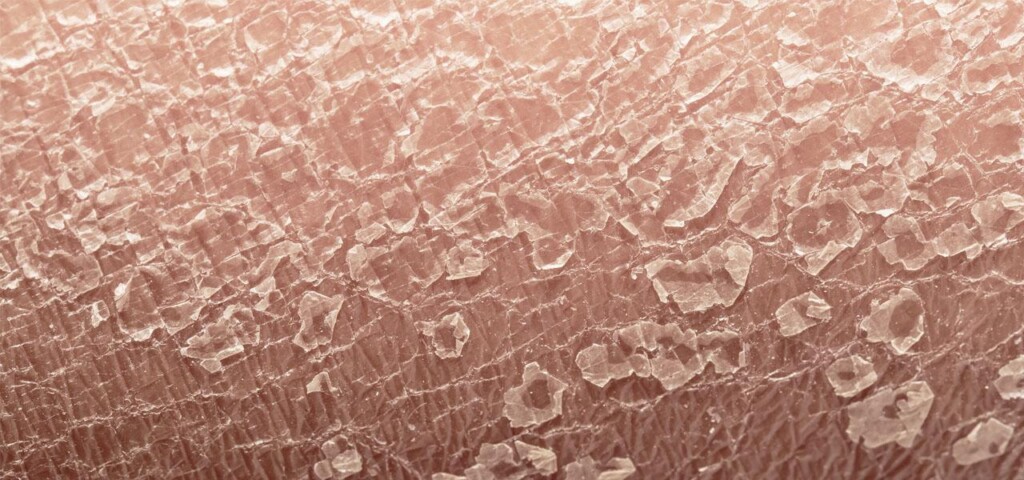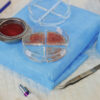Scalp psoriasis is quite a chronic disease. Patients often struggle with periods of remission and exacerbation, that alternate. The characteristic symptoms of this disease are flaky patches of skin, under which there is red tissue. Fortunately, you can fight psoriasis effectively, and the key to success is a good diagnostic and a high-quality treatment.
What are the causes of psoriasis on the head?
The causes of psoriasis, despite many studies, have not been fully understood. Underlying psoriasis is accelerated by epidermal cell division and exfoliative disorders. For healthy skin, the process of cell transformation takes 26-28 days. During this time, the cell develops, matures and dies. For patients with psoriasis, this process takes about 4 days. New cells mature too quickly, and old ones can not keep up with peeling. The skin of sick people is therefore thicker and a layer of dead cells in the form of scales, forms on it. The body attacks its own cells, because it considers them as harmful or foreign. Psoriasis also leads to mechanical injuries, infections, taking certain medications, and pregnancy.
Symptoms of scalp psoriasis
Skin changes on the scalp are usually accompanied by itching, burning or soreness. On the scalp, lesions can take on a different nature from individual and small pink-red papules, to hard and confluent lesions. More advanced changes can take the form of dry and layered shields with silvery-white scales. Skin changes on the head often go to the forehead, ears and neck. Exfoliation of the epidermis is often mistaken for dandruff or seborrheic dermatitis.

Scalp psoriasis can occur as a disease on the scalp or be one of the places, where symptoms appear on the human body. The first symptoms of the disease may occur at a very young age (usually teenagers) or for people over 50 years of age.
Scalp psoriasis and hair loss
The disease may be accompanied by excessive hair loss. Hair loss is caused by several reasons, for example by frequent scratching of the skin. The process of removing the scales can cause hair loss. Preparations used to treat psoriasis often contain salicylic acid, which can affect the damage of hair follicles.
Diagnosis of scalp psoriasis
The disease can be diagnosed by a trichologist or dermatologist. An interview with the patient, during which very precise information is obtained. The most important, however, are trichological tests, which include trichoscopy. The test will be performed with a pen-like device. The trichoscope’s head is equipped with a camera, which will allow the skin to enlarge. The taken photos can be sent to the laboratory for analysis. There is also the possibility of collecting and examining hair follicles, and this examination is called a trochogram. These tests will be helpful in diagnosing the disease, as well as determining the stage of the disease.
Treatment
Despite the availability of very modern medication, psoriasis will not disappear permanently, and treatment will lead to remission. The treatment is carried out in two stages. First, exfoliants and scales are used. The second stage is medication, which suppresses the inflammatory process and excessive epidermal proliferation. General treatment, which involves the administration of retinoids, can also be used. Oral medications are used in very advanced cases of the disease. The doctor selects the treatment based on a visual examination of the scalp and the stage of the disease. In case of low effectiveness of the treatment, you can change its way.
Scalp treatments
Scalp treatments will help to treat psoriasis. We include:
- Scalp mesotherapy: this procedure involves subcutaneous administration of nutritional mixtures. Vitamin mixtures or platelet-rich plasma are used for this purpose. Mesotherapy can be carried out with needles – a nourishing cocktail is injected with a cannula. You can also use a special gun.
- UVA / UVB / PUVA therapy: treatments involve irradiation of the scalp.
- Dr CYJ Hair Filler: subcutaneous administration of a special preparation to prevent hair loss and stimulate hair growth.
The trichologist may also perform other scalp treatments, that will match the patient’s individual circumstances. Psoriasis is a disease that is quite difficult to treat and is manifested in periods of remission and severity. The comprehensive treatment will increase the chance of disease remission, i.e. reduce its symptoms.
Home remedies for scalp psoriasis
We can also limit the development of the disease using home remedies. Home remedies should, however, only be an addition to special medical treatments. Patients with psoriasis should watch out for any factors that affect skin irritation. They must therefore watch out for excessive sun exposure. The head should be washed with a mild shampoo. Avoid scratching the scalp, as this will damage the skin and weaken hair follicles. Hair must be combed gently, by using soft brushes or combs with widely spaced teeth. A balanced diet and avoiding alcohol and cigarettes, will also support your treatment.





